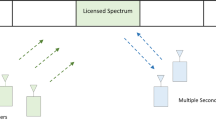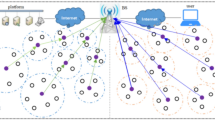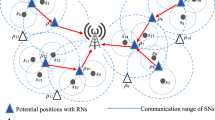Abstract
In recent years, the 6G technology has been increased in many different applications especially in mobile communications. So, the mobile data growth is increased which creates the issues in the control plane load (IoE, IoT). These problems are solved by efficient utilization of the resources and reduce the energy consumption in the cognitive radio network (CRN). In literature, many methods are developed by researchers to manage the spectrum sensing as well as energy efficient operation, but its sill require the improvement to increase the system efficiency and capacity. Hence, in this paper, the oppositional function based chimp optimization algorithm (OFCOA) method is developed in the CRN to manage the energy as well as resource allocation. The proposed method is a combination of the oppositional function (OF) and chimp optimization algorithm (COA). In the COA, the optimal solution process is enhanced with the consumption of the OF. The proposed method is enabling energy efficient operation in CRN by manage the energy with the consideration of spectrum sensing. The proposed method is validated with the consideration of four conditions of primary user (PU) and secondary user (SU) with channel occupation and detection in CRN network. The proposed methodology is implemented in MATLAB and performances are evaluated by performance metrices such as throughput, network life time, delivery ratio, delay, drop, energy consumption and overhead. The performance of the proposed methodology is compared with the conventional methods such as chimp optimization algorithm (COA), whale optimization algorithm (WOA) and particle swarm optimization (PSO) respectively.















Similar content being viewed by others
Data Availability
The already existing algorithms data used to support the findings of this study have not been made available.
References
Benazzouza S, Ridouani M (2021) Fatima salahdine and aawatifhayar, "chaotic compressive spectrum sensing based on chebyshev map for cognitive radio networks. Symmetry 13(3):429. https://doi.org/10.3390/sym13030429
Kalpana Devi M, Umamaheswari K (2021) Optimization techniques for spectrum handoff in cognitive radio networks using cluster based cooperative spectrum sensing. Wirel Netw. https://doi.org/10.1007/s11276-021-02549-7
Giriand MK, Majumder S (2021) cooperative spectrum sensing using extreme learning machines for cognitive radio networks. IETE Tech Rev 2021:1–15. https://doi.org/10.1080/02564602.2021.1896979
Obite F, Usman AD, Okafor E (2021) An overview of deep reinforcement learning for spectrum sensing in cognitive radio networks. Dig Sig Process Rev J. https://doi.org/10.1016/j.dsp.2021.103014
Chaurasiya RB, Shrestha R (2021) A new hardware-efficient spectrum-sensor vlsi architecture for data-fusion-based cooperative cognitive-radio network. IEEE Trans Very Large Scale Integr Syst 29(4):760–773. https://doi.org/10.1109/TVLSI.2021.3055344
Chuang C-L, Chiu W-Y, Chuang Y-C (2021) Dynamic multiobjective approach for power and spectrum allocation in cognitive radio networks. IEEE Syst J. https://doi.org/10.1109/JSYST.2021.3061670
Devi M, Sarma N, Deka SK (2021) Multi-winner spectrum allocation in cognitive radio networks: a single-sided auction theoretic modelling approach with sequential bidding. Electronics 10(5):602. https://doi.org/10.3390/electronics10050602
Sanka SN, Yarram TR, Yenumala KC, Anumandla KK, Dabbakuti JK (2021) Dragonfly algorithm based spectrum assignment for cognitive radio networks. Mater Today Proc. https://doi.org/10.1016/j.matpr.2020.11.301
Alonso RM, Plets D, Deruyck M, Martens L, Nieto GG, Joseph W (2021) Multi-objective optimization of cognitive radio networks. Comput Netw 184:107651. https://doi.org/10.1016/j.comnet.2020.107651
El Azaly NM, Badran EF, Kheirallah HN, Farag HH (2021) Performance analysis of centralized dynamic spectrum access via channel reservation mechanism in cognitive radio networks. Alex Eng J 60(1):1677–1688. https://doi.org/10.1016/j.aej.2020.11.018
Arikatla JL, Swamy GN, Prasad MG (2022) Dynamic coordinative estimation enhancement in cognitive radio network. J Ambient Int Hum Comput. https://doi.org/10.1007/s12652-021-02935-1
El-Saleh AA, Shami TM, Nordin R, Alias MY, Shayea I (2021) Multi-objective optimization of joint power and admission control in cognitive radio networks using enhanced swarm intelligence. Electronics 10(2):1–27. https://doi.org/10.3390/electronics10020189
Chuang C-L, Chiu W-Y, Chuang Y-C (2021) Dynamic multiobjective approach for power and spectrum allocation in cognitive radio networks. IEEE Syst J. https://doi.org/10.1109/JSYST.2021.3061670
Dinesh G, Venkatakrishnan P, Meena Alias Jeyanthi K (2021) Modified spider monkey optimization-an enhanced optimization of spectrum sharing in cognitive radio networks. Int J Commun Syst 34(3):e4658. https://doi.org/10.1002/dac.4658
Kumar MA, Siddaiah P (2022) Spectral efficiency enhancement of green metric cognitive radio network using novel channel design and intellectual African buffalo optimization. J Amb Int Hum Comput. https://doi.org/10.1007/s12652-021-03159-z
Giri MK, Majumder S (2021) Eigenvalue-based cooperative spectrum sensing using kernel fuzzy c-means clustering. Dig Signal Process 111:102996. https://doi.org/10.1016/j.dsp.2021.102996
Kaur A, Sharma S, Mishra A (2021) An efficient opposition based grey wolf optimizer for weight adaptation in cooperative spectrum sensing. Wirel Personal Commun 118:2345–2364. https://doi.org/10.1007/s11277-021-08129-4
Khalaf OI, Ogudo KA, Singh M (2020) A fuzzy-based optimization technique for the energy and spectrum efficiencies trade-off in cognitive radio-enabled 5G network. Symmetry 13(1):1–14. https://doi.org/10.3390/sym13010047
Prem Jacob T, Pravin A, Nagarajan G (2021) Efficient spectrum sensing framework for cognitive networks. Concurr. Comput. 33(3):e5187. https://doi.org/10.1002/cpe.5187
Chauhan P, Deka SK, Chatterjee BC, Sarma N (2021) Cooperative spectrum prediction-driven sensing for energy constrained cognitive radio networks. IEEE Access 9:26107–26118. https://doi.org/10.1109/ACCESS.2021.3057292
Eappen G, Shankar T (2021) Multi-objective modified grey wolf optimization algorithm for efficient spectrum sensing in the cognitive radio network. Arab J Sci Eng 46(4):3115–3145. https://doi.org/10.1007/s13369-020-05084-3
Menon R, Kulkarni A, Singh D, Venkatesan M (2021) Hybrid multi objective optimization algorithm using taylor series model and spider monkey optimization. Int J Numer Meth Eng. https://doi.org/10.1002/nme.6628
Khishe M, Mosavi MR (2020) Chimp optimization algorithm. Expert Syst Appl 149:113338. https://doi.org/10.1016/j.eswa.2020.113338
Khishe M, Mosavi MR (2020) Classification of underwater acoustical dataset using neural network trained by chimp optimization algorithm. Appl Acoust 157:107005. https://doi.org/10.1016/j.apacoust.2019.107005
Raja M, Dhanasekaran S, Vasudevan V (2021) Opposition based joint grey wolf-whale optimization algorithm based attribute based encryption in secure wireless communication. Wirel Pers Commun. https://doi.org/10.1007/s11277-021-08357-8
Hu G, Dou W, Wang X, Abbas M (2022) An enhanced chimp optimization algorithm for optimal degree reduction of Said-Ball curves. Math Comput Simul 197:207–252
Pravin M, Sundararajan TVP (2022) Hybrid whale optimisation algorithm for energy efficient cognitive radio network. Int J Electron 110(1):1–25
Eappen G, Shankar T, Nilavalan R (2022) Cooperative relay spectrum sensing for cognitive radio network: Mutated MWOA-SNN approach. Appl Soft Comput 114:108072
Singh KK, Yadav P, Singh A, Dhiman G, Cengiz K (2021) Cooperative spectrum sensing optimization for cognitive radio in 6 G networks. Comput Electr Eng 95:107378
Shrestha AP, Yoo S (2018) Optimal resource allocation using support vector machine for wireless power transfer in cognitive radio networks. IEEE Trans Veh Technol 67(9):8525–8535
Zhang X, Li H, Yanhui Lu, Zhou B (2015) Distributed energy efficiency optimization for MIMO cognitive radio network. IEEE Commun Lett 19(5):847–850
Shaowei W, Shi W, Wang C (2015) Energy-efficient resource management in OFDM-based cognitive radio networks under channel uncertainty. IEEE Trans Commun 63(9):3092–3102
Author information
Authors and Affiliations
Corresponding author
Additional information
Publisher's Note
Springer Nature remains neutral with regard to jurisdictional claims in published maps and institutional affiliations.
Rights and permissions
Springer Nature or its licensor (e.g. a society or other partner) holds exclusive rights to this article under a publishing agreement with the author(s) or other rightsholder(s); author self-archiving of the accepted manuscript version of this article is solely governed by the terms of such publishing agreement and applicable law.
About this article
Cite this article
Pravin, M., Sundararajan, T.V.P. Energy Efficient Analysis of CRN-A Hybrid Approach. J. Electr. Eng. Technol. 19, 739–751 (2024). https://doi.org/10.1007/s42835-023-01585-x
Received:
Revised:
Accepted:
Published:
Issue Date:
DOI: https://doi.org/10.1007/s42835-023-01585-x




